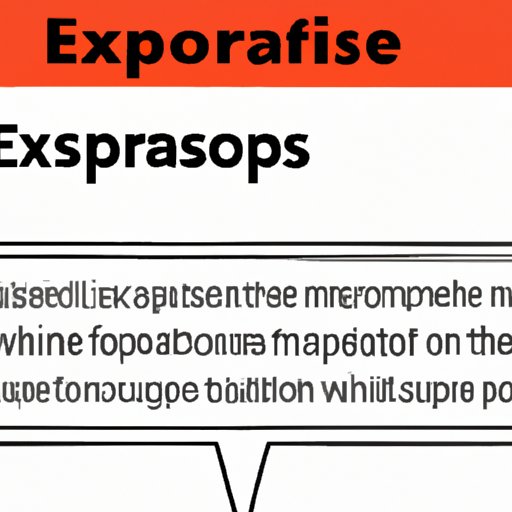Introduction
Expository writing is a type of writing that focuses on presenting an idea, providing evidence, and analyzing the idea. Its purpose is to explain a concept or idea clearly and concisely. Expository writing can take many forms, from research papers to essays to business reports. No matter the form, the goal of expository writing is to present information in a clear and logical manner.

Analyzing the Components of Expository Writing
Expository writing typically follows a specific structure. The introduction provides the reader with a brief overview of the topic, then the thesis statement states the main point or argument. Supporting evidence is provided to back up the thesis statement, then the conclusion summarizes the main points and restates the thesis.

Exploring the Benefits of Expository Writing
Expository writing has many benefits. It can help enhance critical thinking skills by requiring the writer to evaluate evidence and draw logical conclusions. It can also strengthen communication skills by helping the writer express their ideas clearly and concisely. Additionally, expository writing can improve organization and clarity by requiring the writer to structure their thoughts in a logical way.
Examining How Expository Writing is Used in Different Contexts
Expository writing is used in many different contexts. In academic writing, it is often used to explain a concept or provide an analysis of a topic. In business writing, it can be used to provide instructions or to report findings. In journalism, it can be used to provide a factual account of an event or to analyze an issue.

Comparing Different Types of Expository Writing
There are several different types of expository writing. Descriptive writing is used to describe a person, place, or thing in detail. Process writing explains how something works or how to do something step-by-step. Cause and effect writing analyzes the causes and effects of an event or situation.
Offering Tips and Strategies for Writing Expository Essays
Writing an effective expository essay requires careful planning and preparation. The first step is to brainstorm ideas and do some research on the topic. Once you have a general idea of what you want to write about, you should structure your essay in a logical way. This includes writing an introduction, a thesis statement, supporting evidence, and a conclusion. After writing the first draft, it is important to review and revise your work. Make sure all your points are clear and that your essay flows logically.
Conclusion
Expository writing is a type of writing that is used to explain a concept or idea. It typically follows a specific structure, with an introduction, a thesis statement, supporting evidence, and a conclusion. Expository writing can benefit writers by enhancing critical thinking skills, strengthening communication skills, and improving organization and clarity. It is used in many contexts, such as academic writing, business writing, and journalism. There are several different types of expository writing, including descriptive writing, process writing, and cause and effect writing. To write an effective expository essay, it is important to plan, structure, and revise your work.
(Note: Is this article not meeting your expectations? Do you have knowledge or insights to share? Unlock new opportunities and expand your reach by joining our authors team. Click Registration to join us and share your expertise with our readers.)
